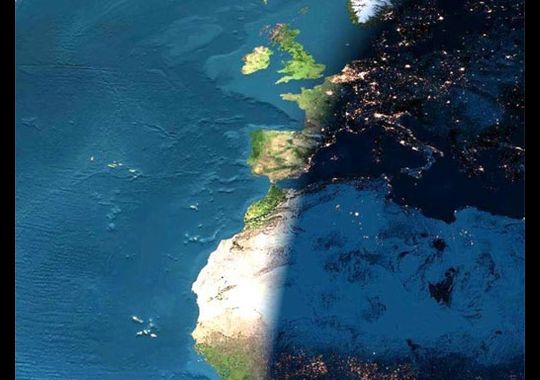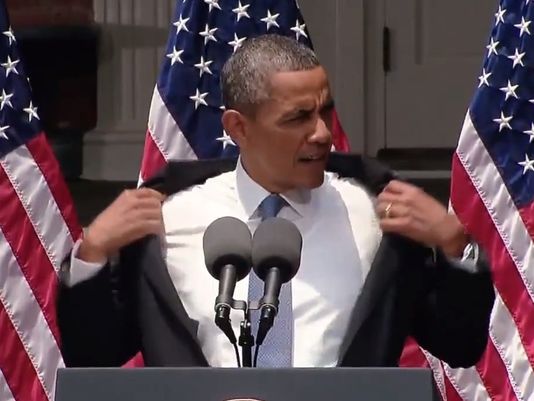Storytelling science illuminates climate views
Who's your hero? Superman? Batman? The Environmental Protection Agency?
The answer may say something about how you read news stories about climate change, suggests a scientific experiment that tested how people think about science.
President Obama made "carbon pollution" the bad guy in his speech this week outlining federal steps to cut greenhouse gas emissions, particularly carbon dioxide from power plants. Carbon dioxide released by burning coal, oil, natural gas and other fossil fuels is the leading "greenhouse" gas that retains heat in the atmosphere. Such gasses are the leading drivers behind global warming, including the roughly 1.3-degree[1] increase in average surface temperatures nationwide over the past century. Temperatures are likely to increase even more in this one, according to the U.S. National Academy of Sciences and other scientific bodies.[2]
How you read all that information may depend on your outlook on life, suggests the recent Political Psychology journal study by political scientists Michael Jones of Virginia Tech[3] and Geoboo Song of the University of Arkansas.
The study quizzed 2,005 people on their environmental views, then sorted them into three common types seen in past psychology studies examining perspectives on the environment: "hierarchs" who view experts as necessary to help the planet avert precarious environmental disasters; "egalitarians" who are cautious about human activities they see as threatening a fragile environment; and "individualists" who see see nature as resilient as long as events are allowed to run their natural course.
Next they asked separate groups of these folks to read 800-word news stories about climate change. All these stories contained factual information about global warming that was identical. All of it was taken from the 2007 Intergovernmental Panel on Climate Change report, an exhaustive summary of climate science assembled by a worldwide group of scientists.
The only difference between the news stories was that they swapped out who was the hero and the bad guy in each one.
Each person read only one story. Here's how it worked:
•In the egalitarian-themed story, selfish corporations and governments have driven the environment "to the brink of destruction," and environmental groups are the heroes leading a call for using solar, wind and other "renewable" energy sources to beat greenhouse gases.
•In a hierarchical-themed one, the heroes are governments and scientists who tame runaway markets and population increases that threaten the environment by using nuclear energy that obviates the need for fossil fuels.
•In the individualist-themed one, the good guys are industry think-tanks and pundits who face "naive but dangerous," idealist and self-interested government villains standing in the way of free-market solutions to climate change, such as creating a business to buy and sell trading rights to carbon emissions.
As a control measure, they asked some folks to read a fact sheet with the information in the stories, widely seen as the worst way to get information across to people. (The kind of list you see above you right now. Did you read it?)

The curved "terminator" between day and night is seen in a composite view from space over Africa and Europe.(Photo: NASA)
Past work by Jones[4] and his colleagues has shown that people retain information better from stories that are congruent with their outlook, a kind of "motivated reasoning" where people reinforce messages they already have in their heads and downplay anything jarring with the established views.
In the new study, the researchers wanted to look under the hood on how this happens, so they asked people to categorize the information in the stories. By seeing how different kinds of people sorted 27 different terms found in the stories — words for heroes, villains and adjectives such as "scientific expertise," "environmentalist" and "terrifying" — they hoped to understand how people were thinking after reading them.
People in the experiments were asked to sort all the terms into six categories of their own choosing.Participants were told there was no right or wrong answer.
What the study found is that asking people to read a story that didn't match their environmental outlook scrambled how they categorized the terms used in the news stories. Individualists who read an individualist-themed story clustered environmental groups into one category and put "industry," "competition" and "free markets" into another. Nice and neat. Individualists asked to read the egalitarian story seemed confused, putting the free-market Cato Institute into the same category as the environmentalist Club of Rome, or putting "cap and trade" (a market for pollution trading) into a category with "population control."
"Overall, people sorted things differently depending on whether they had read a story congruent or incongruent with their views," Jones says, at least for individualists and egalitarians (Jones doesn't label these two groups as libertarians and environmentalists, by the way, but a casual reader might). "Heroes are clustered with policy solutions," the study says. "(N)egative adjectives are clustered with villains and alternative policy solutions."
In other words, reading a story at odds with your world view scrambled how clearly folks could think about the information they had read. "If the story did not line up with their cultural orientation, then it might as well have been a list," the study concludes.
"The findings furnish a stunningly vivid demonstration of how complex beliefs about climate change are and how sensitive they are to cultural meanings," says psychology professor Dan Kahan of Yale Law School, who studies how people think about scientific information.
Kahan says it would be a mistake to see the study's results as a "how to" guide for writing news stories. They point to different ways that people think about the news and offer avenues to understanding the best way to get information across to them.
That matters because these very kinds of stories are battling it out right now over climate. Obama decried "carbon pollution" and called for "using less dirty energy, using more clean energy, wasting less energy" in his speech. One of his critics, House Science committee chairman Lamar Smith, R.-Texas, countered by saying, "It is only through sustained economic growth that we will be able to make the investments in research and technology necessary to fully understand and properly deal with problems like climate change." Both arguments could have come straight out of the Political Psychology journal study.
Fans of communication experiments might note that the big applause line in Obama's speech was his comparison of climate change naysayers to "a meeting of the Flat Earth Society," The joke seems to have struck home with Obama's political foes, notes Politico's Darren Goode[5], who sees the climate debate moving from the science to economics after the speech.
How will that turn out? For anyone looking to the study as a guide to future climate debates, there was at least one exception in its results worth noting. Environment-loving egalitarians, as you might expect, clustered the information in the stories better after reading the egalitarian story. Unlike elsewhere in the study, hierarchic and individualistic readers also tended to sort information in an egalitarian-leaning way after reading the egalitarian story about environmentalists championing renewable energy.
It could be that everybody likes windmills and nobody really likes nukes, Jones suggests. "Or it could be that the egalitarian story is a kind of dominant one in our culture underneath everything else."
References
- ^ http://www.epa.gov/climatechange/science/indicators/weather-climate/temperature.html (www.epa.gov)
- ^ http://nas-sites.org/americasclimatechoices/files/2012/06/19014_cvtx_R1.pdf (nas-sites.org)
- ^ http://www.cpap.vt.edu/chairs_message.asp (www.cpap.vt.edu)
- ^ http://usatoday30.usatoday.com/tech/science/columnist/vergano/2010-11-05-climate-story_N.htm?csp=34news (usatoday30.usatoday.com)
- ^ http://www.politico.com/story/2013/06/gop-climate-tack-talk-jobs-not-science-93482_Page2.html (www.politico.com)










